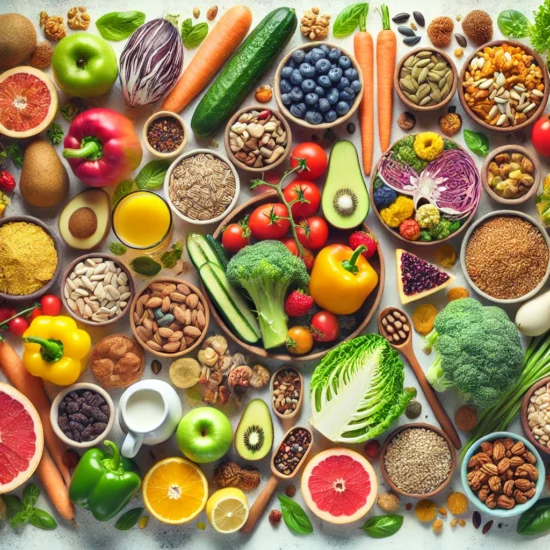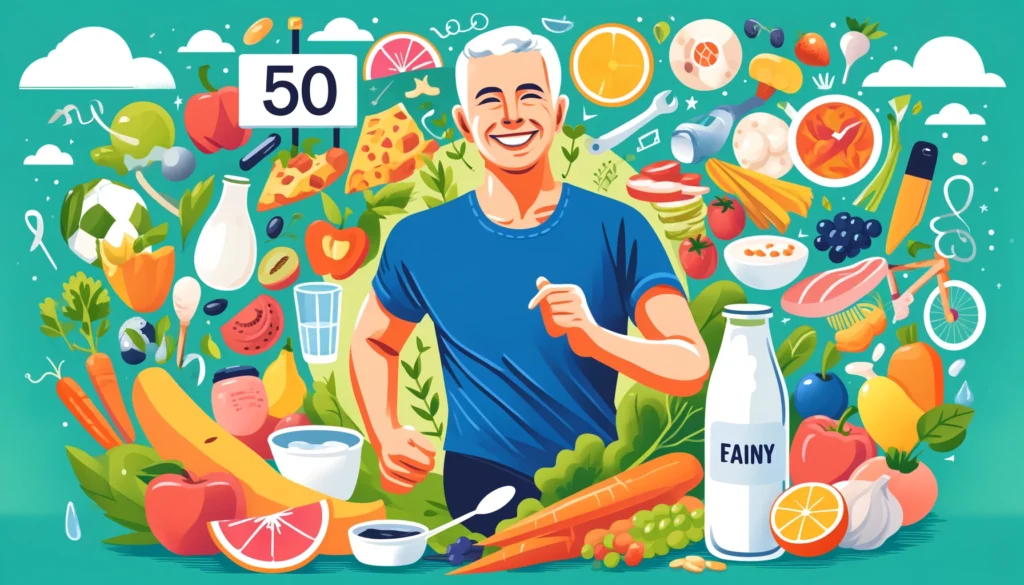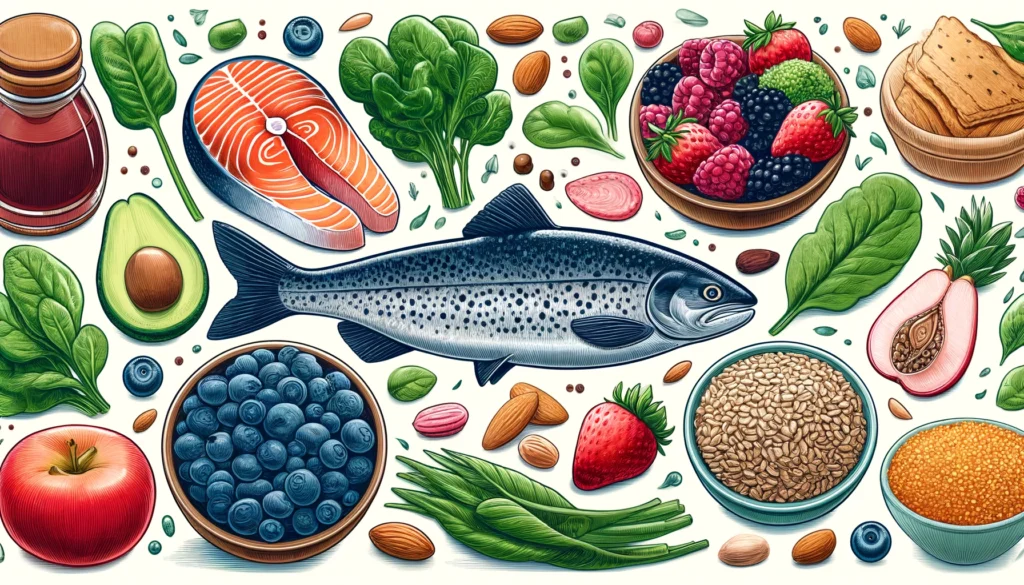Date: 10-30-2024
Introduction: Embracing Nutrition in Your 60s
Reaching your 60s is a significant milestone, filled with wisdom and, ideally, vibrant health. This stage of life brings new dietary considerations that are essential for maintaining a high quality of life, as nutritional needs shift with age. Nutrients that support bone health, cognitive function, heart health, and muscle mass are more important than ever. Eating the right foods can help prevent common health issues associated with aging, from osteoporosis and heart disease to muscle loss and cognitive decline. In this guide, we’ll explore the foods best suited to nourish your body in your 60s, packed with essential vitamins, minerals, and antioxidants to support a healthier, more energized you.
Nutritional Needs in Your 60s
As we age, our body’s ability to absorb nutrients changes, and certain nutrients become even more critical. Here’s an overview of what to prioritize:
- Protein: Muscle mass naturally decreases with age, and protein is essential for maintaining it. Research suggests adults over 60 benefit from increased protein intake to support muscle health.
- Fiber: Digestive health can become more challenging as we age. Fiber supports regularity and helps prevent constipation, a common issue in later years. It’s also key for maintaining healthy cholesterol levels and stabilizing blood sugar.
- Calcium and Vitamin D: Bone density declines with age, making calcium and vitamin D crucial. Together, they support bone health, lowering the risk of fractures and osteoporosis.
- Omega-3 Fatty Acids: Found in certain fish, nuts, and seeds, omega-3s have anti-inflammatory properties that help with brain health and reduce the risk of heart disease.
- Antioxidants: These powerful compounds combat oxidative stress, which contributes to aging and chronic diseases. Vitamin C, vitamin E, and beta-carotene are key antioxidants that protect cells.
Best Foods for Healthy Aging
1. Protein-Rich Foods
- Lean Meats (e.g., chicken, turkey): High in protein, low in saturated fats, and easy on the digestive system. These meats help maintain muscle mass and strength.
- Fish (e.g., salmon, trout): An excellent source of protein and omega-3 fatty acids, which benefit heart health and reduce inflammation.
- Beans and Lentils: These plant-based proteins also offer fiber, iron, and B vitamins, essential for energy and digestion.
- Greek Yogurt: Contains probiotics to support gut health, along with protein and calcium for bones.
- Eggs: A versatile protein source loaded with choline, which supports brain health.
2. Fiber-Rich Foods
- Oats: High in soluble fiber, oats help reduce cholesterol and improve heart health.
- Whole Grains (e.g., quinoa, barley): Provide fiber, B vitamins, and minerals like magnesium and iron.
- Berries (e.g., blueberries, strawberries): Packed with fiber and antioxidants, they help with digestion and combat oxidative stress.
- Leafy Greens (e.g., kale, spinach): These provide fiber and essential nutrients like calcium, vitamin K, and iron for bone health and circulation.
- Vegetables (e.g., broccoli, carrots): High-fiber vegetables also offer antioxidants and anti-inflammatory benefits, promoting overall health.
3. Healthy Fats
- Avocado: High in monounsaturated fats, which support heart health and provide anti-inflammatory benefits.
- Olive Oil: A staple of the Mediterranean diet, olive oil is linked to lower rates of heart disease and helps improve cholesterol levels.
- Nuts and Seeds (e.g., almonds, walnuts, flaxseed): Rich in healthy fats, fiber, and omega-3s, they support brain health and reduce inflammation.
- Fatty Fish: Beyond protein, fatty fish like salmon and sardines are also high in omega-3s.
4. Bone-Boosting Foods
- Dairy (e.g., milk, cheese): High in calcium and fortified with vitamin D, dairy is essential for bone health.
- Fortified Plant Milks (e.g., almond, soy): An excellent alternative for those who avoid dairy, offering calcium and vitamin D.
- Leafy Greens: Spinach, collard greens, and kale provide both calcium and vitamin K, which is essential for bone density.
- Tofu: A plant-based calcium source, tofu is also rich in protein, making it a fantastic addition to a balanced diet.
5. Brain-Healthy Options
- Fatty Fish: Rich in DHA, an omega-3 that supports cognitive health.
- Blueberries: High in antioxidants that protect the brain from oxidative damage and support memory.
- Turmeric: Contains curcumin, a compound with anti-inflammatory effects that may help reduce the risk of Alzheimer’s.
- Leafy Greens: These are linked to slower cognitive decline and are packed with vitamins like folate and vitamin K.
- Walnuts: Unique among nuts for their high omega-3 content, walnuts are excellent for brain health.
6. Heart-Healthy Choices
- Whole Grains: Oats, barley, and quinoa provide fiber and help manage cholesterol.
- Leafy Greens: High in nitrates, which can help lower blood pressure.
- Berries: These support heart health with their high levels of antioxidants and fiber.
- Beans: Rich in fiber, beans are linked to better heart health due to their cholesterol-lowering effects.
Foods to Limit
While adding nutritious foods is essential, it’s also important to limit certain types of foods that can negatively impact health:
- Sugary Foods and Beverages: High sugar intake can lead to insulin resistance and increase the risk of diabetes.
- Processed Meats: Linked to heart disease and cancer, it’s best to avoid or limit foods like bacon, sausages, and deli meats.
- Refined Carbs: Foods like white bread and pastries spike blood sugar levels and can increase the risk of metabolic issues.
- High-Sodium Foods: Excess sodium can elevate blood pressure. It’s best to minimize salt intake and avoid processed foods.
- Trans Fats: Often found in fried foods and baked goods, trans fats are harmful to heart health and are best avoided.
Lifestyle Tips for Incorporating These Foods
- Meal Planning: Plan meals in advance to ensure you’re getting a balanced intake of protein, fiber, and healthy fats.
- Cooking at Home: Preparing meals allows you to control ingredients and portion sizes, making it easier to eat healthily.
- Sn acking Smart: Choose nutrient-dense snacks, like nuts, yogurt, or fruit, instead of processed options.
- Hydration: Staying hydrated is crucial, as dehydration is a common issue in older adults and can affect energy levels and overall health.
- Moderation with Treats: Enjoy indulgent foods occasionally to avoid feeling deprived, while prioritizing nutrient-rich options most of the time.
Conclusion: Thriving Through Nutrition in Your 60s
Embracing a nutrient-dense diet in your 60s is one of the best ways to support lifelong health and vitality. Prioritizing proteins, fiber, healthy fats, and bone-boosting nutrients helps safeguard against many age-related health challenges, from muscle loss to cognitive decline. Pairing these choices with lifestyle habits such as meal planning, staying hydrated, and limiting processed foods can empower you to live each day with energy and resilience. Remember, it’s not about restrictive eating—it’s about nourishing your body with the nutrients it needs to thrive in every season of life.



